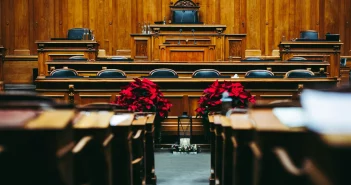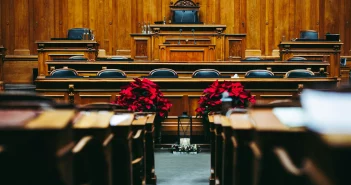The noted American historian, and Putin critic,Timothy Snyder’s recent text Our Malady: Lessons in Liberty and Solidarity (2020) is a cri de coeur against almost non-existent healthcare rights in the U.S. – which the pandemic brought into sharp focus. The cossetted Yale professor saw the light, as his country failed to cope.
Our Malady is about health care, but it is also an example of confessional literature about how health care provision, or lack thereof, begins to affect even those that are putatively privileged. The pandemic laid bare the limitations of the neoliberal order. But it is not just about healthcare, and not just about the United States, as the pandemic lays waste to income structure, life expectancies and perhaps a whole species’ expectations of the good life.
We urgently require legal arguments in terms of justiciability, resource allocation and clarification of the limits and extent of judicial powers to enforce social and economic rights. These arguments are no longer of cautious relevance given the gathering storm we confront. This is not the time for legal casuistry, or politeness either.
In terms of the consensus as to what these rights are let me sketch a list, all of which are denuded or under threat:
- A right to adequate nutrition.
- A right to clean drinking water, and for bathing.
- A right to basic health care and, in particular, to emergency treatment.
- A right to housing or shelter; alongside a complimentary right to resist arbitrary eviction.
- A right to a minimum or adequate standard of living.
- A right to social security, leading to universal basic income.
- A right to a healthy environment, including air quality.
- A right to education, up to third level.
- A generalised right to dignity and self-expression in terms of expressing one’s identity.
- A right of a country to development.
Crucially, there is a lively discussion as to which of such rights must be progressively realised, and which have a minimum content that are immediately realisable. Thus, the right to health care, both domestically and internationally, is progressively realisable, subject to resources.
A right to emergency health care, however, is a minimum content right with direct enforceability, if justiciable.
Similarly, the right to shelter is progressively realisable, but the international consensus is that forced or arbitrary evictions are directly enforceable again, if justiciable.
Social and economic rights, in fact, have a long intellectual pedigree. Indeed, they are even evident in Thomas Hobbes’s enumeration of Natural Rights. Ancient Greek philosophers also identified such fundamental natural rights as inherent to membership of a polity.
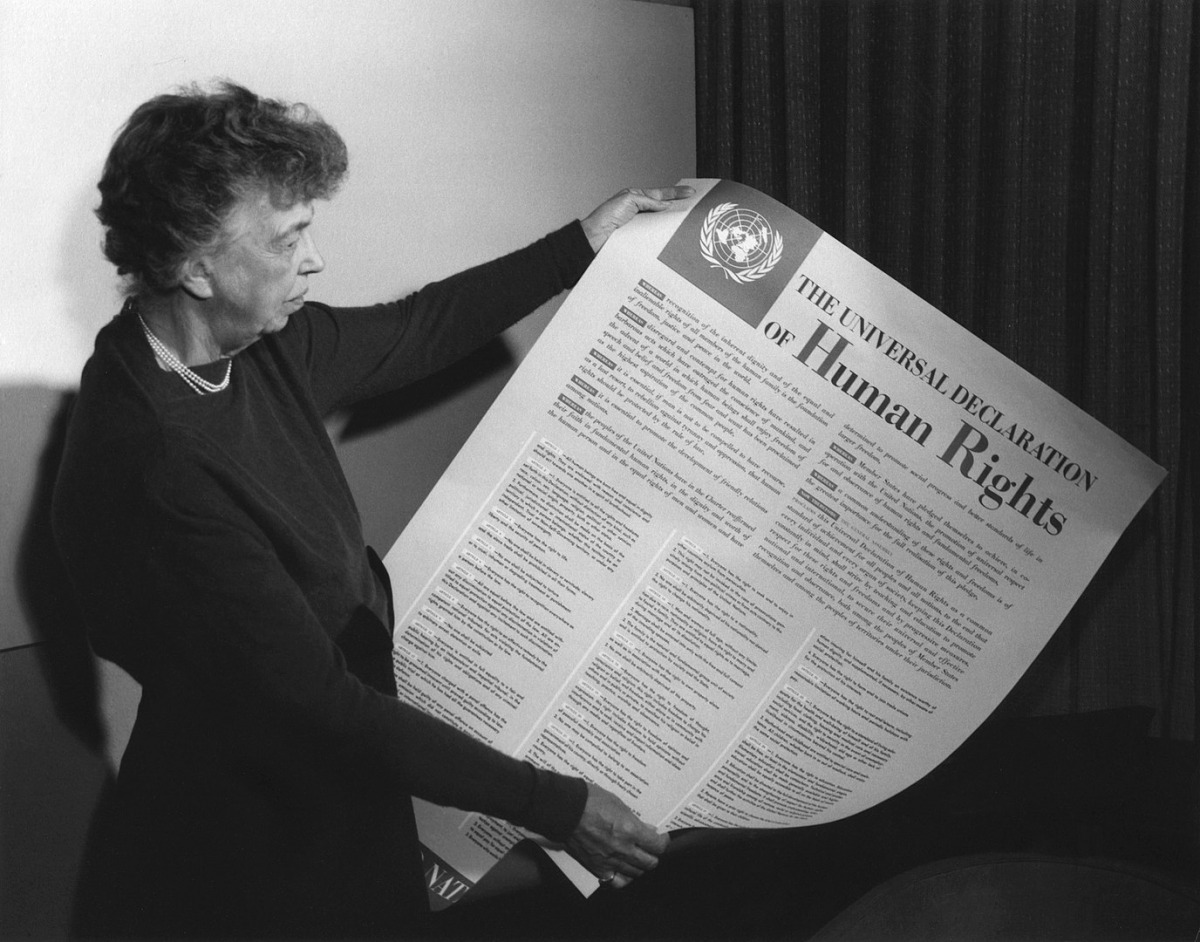
Eleanor Roosevelt with the UN Universal Declaraion of Human Rights.
The proposal to include them in the UN Charter was aborted by representatives of the developed world. They were reconstituted in the 1966 UN Covenant on Civil and Political Rights, but with limited effectiveness, even allowing for recent rights of individual petition. Now amidst a growing convergence between developed and developing societies in the neoliberal order, we are increasingly all in the same boat.
Right to Life
The Indian Supreme Court decision in Olga Tellis v. Bombay Municipal Corporation concerned public interest litigation by thousands of pavement dwellers of Bombay city.
The plaintiffs argued that they could not be evicted from their squalid shelters without being offered alternative accommodation. They further argued that they had chosen a pavement or slum to live because it was nearest to their place of work, and that evicting them would result in deprivation of a right to a livelihood.
The petitioners were to be evicted under the Bombay Municipal Corporation Act, which empowered the Municipal Commissioner to remove encroachments on footpaths or pavements over which the public have a right of passage or access.
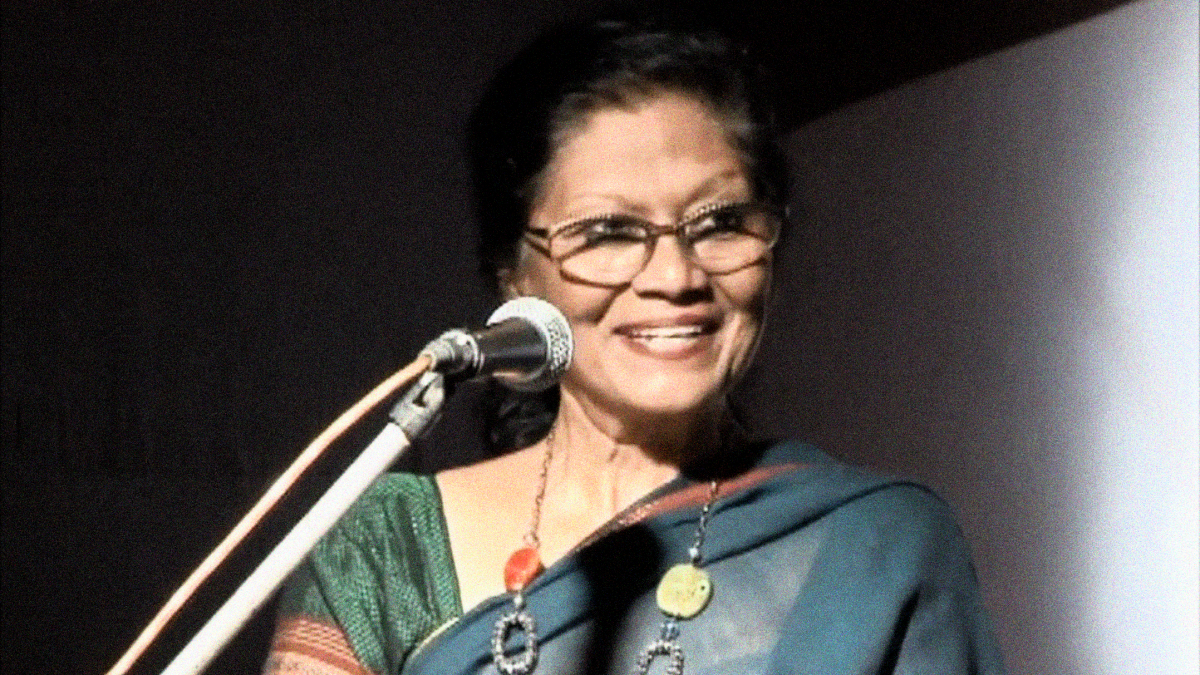
Olga Tellis, Ex Editor of Sunday Observer & Asian Age. Source YouTube.
The relevant article of the Indian Constitution (modelled on Article 45 of the Irish Constitution) excludes the Directive Principles from judicial cognisance, yet the court opined, in finding that the right to life itself was informed by the Directive Principles; that Article 39(a) of the Constitution, which is a Directive Principle of State Policy, provides that the State shall, in particular, direct its policy towards ensuring that citizens have the right to an adequate means of livelihood.
The court concluded that if there is an obligation upon the State to ensure citizens enjoys an adequate means of livelihood and the right to work, it would be an exercise in pedantry to exclude the right to livelihood from the content of the right to life.
The judgement thus expanded the right to life guaranteed under Article 21 of the Indian Constitution to include within its scope the right to livelihood, which in this context translated into the right to be allowed to remain on the pavements.
More remarkably in People’s Union for Civil Liberties v. Union of India & OR’s (2003), India’s Supreme Court derived the right to food from the right to life and ordered that that the Famine Code permitting the release of grain stocks in times of famine be implemented.
The court ordered that the grain allocation for the food to work scheme be doubled and financial support for schemes be increased; that ration shop licensees stay open and provide the grain to families below the poverty line at a set price; that publicity be given to the rights of families below the poverty line to grain; that all individuals without means of support (for example older persons, widows, disabled adults) be granted an Anthodia Anna Yojana ration card for free grain; and that State governments should progressively implement the mid-day meal scheme in schools.
In terms of stretching the bounds of acceptable judicial intervention this case could not be more dramatic, as the Court utilised mandatory policing orders and even inspectors in the field to ensure compliance with their orders, which have spread nationwide.
With inflation in food prices already evident in the wake of the pandemic, will our judicial authorities oblige often reluctant, and even compromised, executive authorities to intervene in the market, and avert shortages? And in Ireland will the Court overcome a reluctance to vindicate a right to housing as part of a generalised right to life?
Global food prices have risen 40% in the past 15 months on account of rising transport costs and blocks in supply chains. This has made banks more likely to increase interest rates, putting recoveries at risk, reports the Financial Times.https://t.co/vKZyyeqgPb
— Bretton Woods Committee (@BrettonWoodsCom) September 14, 2021
Canadian Dissenting Opinion
In Canada a similar conclusion that social and economic rights inform the content of the right to life is evident in a dissenting opinion in the Canadian Supreme Court case of Gosselin v. Attorney General of Quebec (2004).
The case concerned the denial of unemployment assistance to those under thirty-five, who could do a form of workfare in lieu. The court addressed issues pertaining to discrimination and the right to life and security of the person under the Canadian charter. The majority found the law justifiable and in Thatcherite terms as an incentive for the young to work. “Get on your bike”, as Norman Tebbit would put it.
Judge Louise Arbour dissented however, as indeed did Mr Justice Lahreux Herbe. Arbour J. derived a right to minimum social assistance from the right to life and indeed security of the person under Section 7 of the Charter, and drew a prudential distinction between corporate-commercial economic rights and economic rights fundamental to health and human survival.
He indicated that the appeal makes it obvious why ‘those economic rights fundamentals to human life or survival’ should not be treated as akin to corporate commercial economic rights.
Simply put, the rights at issue here are so intimately intertwined with one’s basic health (and hence ‘security of the person’) – and, at the limit, even of one’s survival (and hence ‘life’) — they could readily be accommodated under section 7 rights of ‘life, liberty and security of the person’, without the need to constitutionalize ‘property’ rights or interests.
Notably, Arbour J also links the right to health to the guarantee of security of the person. He argued the expansion of the right to life in this fashion gave content to this right, which is to be protected in such a fashion so as to invest the State with a positive duty to protect life.
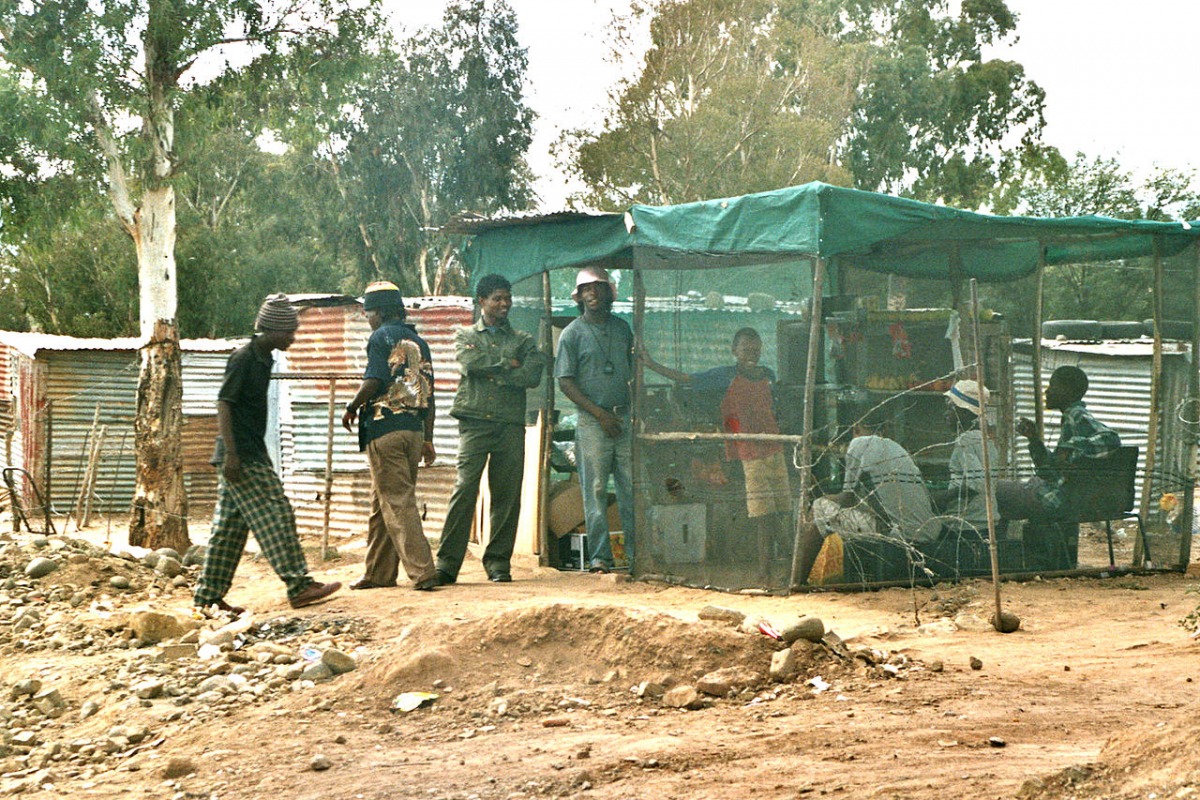
Little shop on the main street of Dukathole, South Africa.
South African Experience
It might be noted that the South African experience is different in that social and economic rights are textual and thus inherently justiciable, with the word dignity mentioned in several places.
The relevant housing provision explored in Government of the Republic of South Africa v Grootboom (2000) is Article 26 whereby:
Everyone has the right to have access to adequate housing. The state must take reasonable legislative and other measures, within its available resources, to achieve the progressive realisation of this right. No one may be evicted from their home, or have their home demolished, without an order of court made after considering all the relevant circumstances. No legislation may permit arbitrary evictions.
The South African Constitution also specifies an immediately enforceable specific minimum right against forced or arbitrary evictions. Such a right entails:
- Meaningful consultation prior to eviction.
- Alternative relocation if eviction proceeds.
- No eviction to proceed unless the land is being put to productive use.
Nonetheless, the South African Courts have set down limits for their review and in general such rights are in the text of the document to be progressively realised.
In Subramani v. Minister for Health (1997) for example the South African Supreme Court was very explicit about the large margin of discretion it would give to the State to set its budget.
It also states that the court: ‘will be slow to interfere with rational decisions taken in good faith by the political organs and medical authorities.’
Sachs J went further stating that:
In open and democratic societies based upon dignity, freedom and equality, the rationing of access to life-prolonging resources is regarded as integral to, rather than incompatible with, a human rights approach to health care.
However, if decisions taken are deemed unreasonable then the South African courts will step in. Thus, in the Minister of Health v Treatment Action Campaign (2002) and in Azbuka and Others v City of Johannesburg (2009) the extent of the right to water was litigated in South Africa after the case arose in Soweto.
Justice Oregon writing for the Constitutional court found the City’s free basic water policy of twenty-five litres per person per day to be reasonable under section 27(1) of the Constitution, and that the introduction of prepaid water meters to be lawful, procedurally fair, and not unfairly discriminatory.
The Court noted that the City was under no constitutional duty to provide any amount of free water, but merely to take reasonable measures to progressively realise that right. It said it could not fix a minimum core amount, as this would vary in terms of personal and local circumstances and would prevent context being considered.
It also argued that this was not a determination for a court to make, as it was properly the role of the democratic branches of government to investigate conditions, having regard to the availability of resources, and to determine achievable targets.
"The Vultures know exactly what they want. But we don’t. So we end up being picked off." Ben Hoey explains what is causing Ireland's Housing Crisis.https://t.co/XbQ3mK1j5u@broadsheet_ie @BowesChay @paddycosgrave @williamhboney1 @caulmick @TomLyonsBiz @RoryHearne #HousingCrisis
— CassandraVoices (@VoicesCassandra) September 18, 2021
Irish Housing
In Ireland, the housing market is chronically under-supplied with affordable units, particularly in Dublin, but increasingly elsewhere too. Many local councils appear reluctant to countenance building modular homes, and the rental market is out of control and extortionate.
David McWilliams blithely advises homeowners to step away from the market, as there is no security for the mortgaged or rentier class, but for most finding a home to live in is not an investment.
The Irish State is also tolerating rampant evictions by banks and Vulture Funds and negligently permitting unfair commercial practices to occur, often in breach of consumer protection.
Thus, lenders have reneged on agreements bartered with consumers at a time of high ostensible economic prosperity by neglecting a contractual obligation to revert the consumer to a tracker mortgage after the expiry of a fixed rate period, or upping interest rates to the highest in the Eurozone, often aimed at those seeking to exit the country.
Thus, lending institutions with no interest in Ireland such as Danske Bank and The Bank of Scotland simply left the room and disposed of their assets, hiking up the mortgage interest rate payments as they left and/or selling assets off to Vulture Funds.
Ulster Bank has followed them out the door, while citizens are thrown out on the streets in spite of the pandemic.
The old cry of the tenant farmer for the 3Fs: Fixity of Tenure; Free Sale and a Fair Rent falls on deaf ears in the era of the Vultures.
The Sinnott Case
In the Sinnott case (2001), comprising judgments from all seven members, the Supreme Court was asked inter alia to adjudicate on the legality of mandatory orders made in the High Court by Judge Peter Kelly. This precedent remains an important brake on the capacity of the Court to vindicate the right to life – which includes a right to shelter – of Irish citizens.
In a leading judgment for the majority Adrian Hardiman, following a High Court decision of Justice Declan Costello in O’Reilly v Limerick UDC (1989) distinguished between commutative and distributive justice, the former bearing on relations between individuals such as found in contract and tort, with the latter involving the distribution of the resources of the State.
In contrast to commutative justice which Hardiman considered central to the Court’s function, he held that the exercise of the Court’s jurisdiction over distributive justice was repugnant to the Separation of Powers.
Despite Justice Costello demonstrating a willingness to countenance distributive justice in the subsequent case of O’Brien v Wicklow District Council (1994) Hardiman only brought to bear his arguments in O’Reilly, and sought to elevate non-justiciability to a constitutional principle.
He said that the apportionment of resources ‘would lead the Courts into the taking of decisions in areas in which they have no special qualification or experience’; and were a judge to engage in ‘designing the details of policy in individual cases or in general, and ranking some areas of policy in priority to others, they would step beyond their appointed role.’ He did, however, allude to generalised ‘human rights to earn a livelihood and hold property.’
It would appear to have been disingenuous for Hardiman to deny jurisdiction on the grounds of judicial incompetence in budgetary affairs. Detailed financial resolutions are, after all, already executed in the commercial arena. The test is one of proportionality, as the South African case law demonstrates.
A paramount right to life under Article 40.3 should now require the Court to make mandatory orders, interceding on behalf of citizens whose health and life is threatened by this Housing Crisis, particularly in the presence of contagious disease. Where the executive and legislature fail to vindicate a right to life the Court must surely assume responsibility.

The Harp needs more than tuning…
A Constitutional Challenge
To deal with homelessness and affordable housing a challenge needs to be made through the courts to establish a right to housing.
The Irish Constitution through Article 45 and a generalised right to life contains minimum rights against forced or arbitrary evictions.
Such a right should lead inter alia: to meaningful consultation begin given prior to any eviction; alternative relocation if eviction proceeds; no eviction proceeding unless the land is being put to productive use.
An arbitrator should also be able to probe into what banks or Vulture Fund intend to do with this vital infrastructure, fundamental to the lives and livelihoods of citizens.
Any arbitrator would of course reject spurious defences involving colossal amounts of borrowings, but should achieve a re-calibration of the system. establishing some equality of arms in the process, now desperately needed.
Shelter from the Storm
Without adequate shelter no one can live a dignified existence. A home – a place of one’s own – is intrinsic to the good life we have a right to expect. But housing is only one issue.
Our social structure is unravelling through the hidden hand of American and Canadian Vulture and Cuckoo Funds. In the dystopian aftermath of the Pandemic, and Screen New Deal, once vibrant communities are fracturing, and social atomization is increasing apace.
In the urban wastelands, we have entered the territory of Chile under Pinochet during the 1970s as Ireland becomes a test case for how much a people can endure.
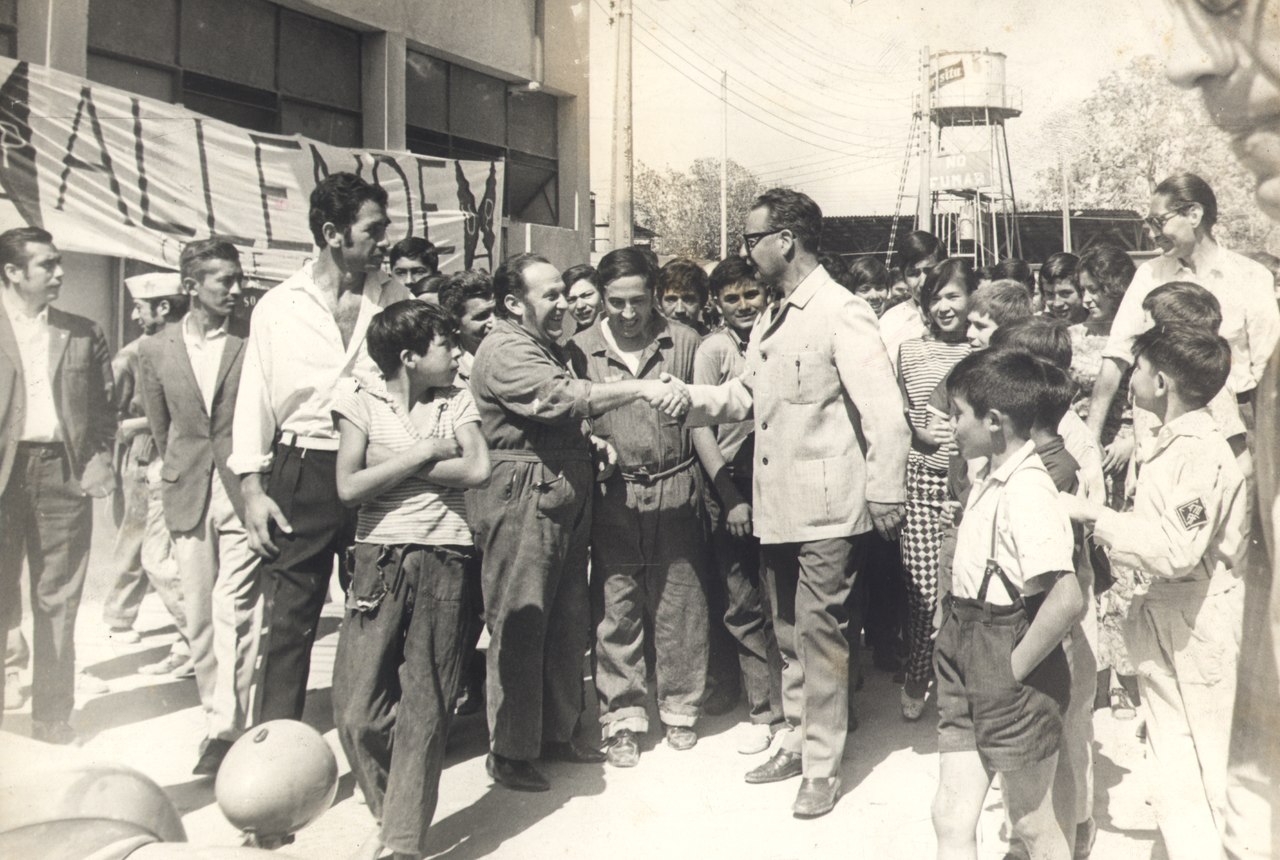
Salvador Allende in 1972.
In her recent novel A Long Petal in the Sea (2019), Chilean novelist Isabel Allende – a distant cousin of the murdered President Salvador Allende – describes the scene in Chile at the time, bearing increasing resemblance to our increasingly dysfunctional society:
He called to tell them that on the surface the country was modern and prosperous, but one only had to dig down a little to see the damage underneath. The degree of inequality was staggering: three-quarters of the wealth was in the hands of twenty families. The middle class survived on credit; there was poverty for the many and opulence for the few; shantytowns contrasting with glass skyscrapers and mansions behind walls. Wellbeing and security for some; unemployment and repression for others. The economic miracle of recent times, based on absolute freedom for capital and a lack of basic rights for workers, had burst like a bubble.
Similarly:
The military government had decided public services should be in private hands. Health was not a right, but a consumer good to be bought and sold. In those years when everything that everything had been privatized had been, from electricity to airlines, a plethora of private clinics had sprung, with state-of-the art buildings and facilities for those who could afford them.
One thinks of The Beacon Hospital and other facilities reserved for Ireland’s wealthy health consumers.
Life depends on livelihoods, now threatened by disproportionate measures. There must be an alternative. Otherwise, suicide, shortened lives, poverty, inequality, social exclusion, and social fragmentation await, leading to fascism and extremism. In this respect, COVID-19 has been the perfect storm of opportunism, or a coalition of interests.



